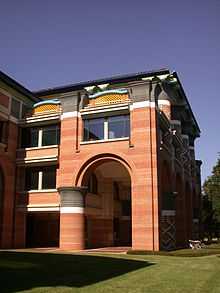John Outram
| John Outram | |
|---|---|
| Born |
21 June 1934 Taiping, Malaya |
| Nationality | British |
| Practice | John Outram Associates |
| Buildings | ANNE & CHARLES DUNCAN HALL, Rice University, Houston, Texas[1] |
John Outram is a British architect. He established a practice in London in 1973 and produced a series of buildings in which polychromy and Classical allusions were well to the fore. Among his works are the temple-like Storm Water Pumping Station, Isle of Dogs, London (1985–8), the New House at Wadhurst Park, Sussex (1978–86), the Judge Institute of Management Studies in Cambridge (1995), and the Computational Engineering Building (Duncan Hall), Rice University, Houston, Texas (1997).
The New House, Sussex
The house was completed in 1986, and was described by a British critic as "probably the best house built since the war. It is inspired by classical proportions, yet is absolutely original." [2] In 1999–2000 he added a Millennium Verandah to the house,[3] featuring columns inspired by Indian, Sumerian, and other cultures.
Pumping Station, Isle of Dogs, London, 1986
In the mid 1980s, the London Docklands Development Authority awarded contracts for three storm-water pumping stations to Richard Rogers, Nicholas Grimshaw, and Outram.[4] The buildings are unoccupied and secure. Outram built a "monumental temple"[5] with which he hopes to situate the viewer "within a Landscape of Symbols".[4]
Cambridge Judge Business School, 1995


The extensions and re-organization of Digby Wyatt's Addenbrooke's Old Hospital as the Judge Institute of Management Studies (now called the Cambridge Judge Business School),[1] Cambridge (1993–5), combines the language of Classical architecture with the engineering components necessary in a modern building.

Services, along with access ladders, were incorporated within what Outram has called the ‘Robot Order’ (Ordine Robotico), described by a critic as "the invention of a Sixth Order, an act of sheer Architectural terrorism' [6]), and by another as "...a collection of places, at once archaic and hypermodern",[7] neither exposed nor hidden away, but used to validate a new architectural order visible throughout the building as the columns and beams large enough to contain the mechanisms needed by Modernity.
Computational Engineering Building (Duncan Hall), Rice University, Houston, Texas, 1996

Outram designed the new building for the Computational Engineering department at Rice University in Houston, Texas, named Anne and Charles Duncan Hall in honor of outgoing college president Charles Duncan, Jr. When completed, it was the largest new building on this 100-year old Campus. It stands next to its oldest building, "one of Houston's most revered architectural monuments".[8]
Other buildings

Other buildings include the Egyptian House in Oxfordshire (2000), Craft Workshops, Welbeck Abbey, Nottinghamshire (2000), and a retail development at the Old Town Hall, The Hague, The Netherlands (2000), in which Egyptianizing, Classical, and other historical references are "treated with verve and imagination" [9]

Notes
- ↑ 1.0 1.1 Pearman, Hugh. "John Outram's "Egyptian House" in Oxfordshire". Gabion. Retrieved 10 September 2012.
- ↑ Jackson-Stops, Gervase (20 August 1989). Sunday Times.
- ↑ "The Millennium Verandah: The new house, Wadhurst, East Sussex". Concrete – via HighBeam Research (subscription required) . 1 October 2000. Retrieved 10 September 2012.
- ↑ 4.0 4.1 Outram, John. "Pumping Station, Isle of Dogs".
- ↑ Rose, Steve (11 September 2011). "Contemporary architecture: examples from the era". The Guardian. Retrieved 10 September 2012.
- ↑ Architecture Today, November 1995.
- ↑ Abitare, November 1996. <
- ↑ Outram, John. "ANNE & CHARLES DUNCAN HALL, Rice University, Houston, Texas".
- ↑ Oxford Dictionary of Architecture and Landscape Architecture. OUP.
External references
- John Outram Associates
- http://www.architecture.uwaterloo.ca/faculty_projects/terri/gallery2/duncan_hall.html